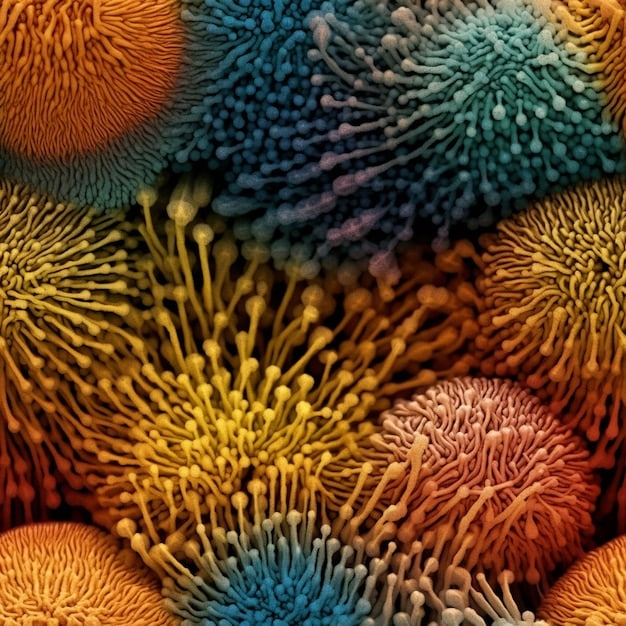Gut Microbiome and Mental Health: Latest US Studies

The impact of the gut microbiome on mental health is increasingly recognized in the US, with recent studies revealing a significant connection between gut bacteria composition and mental well-being, potentially influencing mood, anxiety, and cognitive functions.
The connection between your gut and your brain might be stronger than you think. Emerging research in the US is highlighting the impact of gut microbiome on mental health, suggesting that the trillions of bacteria residing in your digestive system play a crucial role in influencing your mood, anxiety levels, and overall cognitive function.
Understanding the Gut-Brain Axis
The gut-brain axis refers to the bidirectional communication network linking the gut and the brain. This complex system involves direct pathways like the vagus nerve, as well as indirect routes through the immune system, hormones, and neurotransmitters. Understanding this axis is key to understanding how gut health can affect mental health.
The Vagus Nerve: A Direct Line
The vagus nerve is a major component of the parasympathetic nervous system and acts as a direct communication line between the gut and the brain. Signals travel both ways, affecting various bodily functions, including digestion, heart rate, and mood regulation.
Indirect Pathways: Immune System and Neurotransmitters
The gut microbiome influences the immune system by modulating inflammation. Chronic inflammation has been linked to various mental health disorders. Gut bacteria also produce neurotransmitters like serotonin, dopamine, and GABA, which play crucial roles in mood regulation and cognitive function.
The communication system is also affected by:
- Short-Chain Fatty Acids (SCFAs): Produced by gut bacteria, SCFAs influence brain function and behavior.
- The Enteric Nervous System (ENS): Often called the “second brain,” the ENS manages digestion and can operate independently of the brain, but still communicates with it.
- Hormones: The gut microbiome can influence the production of hormones, affecting mental states.
The gut-brain axis is a complex and dynamic system, and maintaining a healthy gut microbiome is crucial for optimal mental health. Disruptions in this axis can contribute to the development of various mental health conditions.

The Role of Gut Microbiome Composition
The composition of your gut microbiome—the balance between different types of bacteria—plays a significant role in mental health. A diverse and balanced gut microbiome is generally associated with better mental well-being, while imbalances can contribute to mental health disorders.
Beneficial vs. Harmful Bacteria
Beneficial bacteria, such as certain strains of Lactobacillus and Bifidobacterium, produce compounds that positively influence brain function, reduce inflammation, and support a healthy gut barrier. Harmful bacteria, when dominant, can produce toxins, increase inflammation, and disrupt the gut-brain axis.
Dysbiosis and Mental Health
Dysbiosis, an imbalance in the gut microbiome, has been linked to various mental health conditions, including anxiety, depression, and even neurodegenerative diseases. Factors such as diet, stress, and medication use can contribute to dysbiosis.
Altering gut health can promote balance in a variety of ways:
- Dietary Changes: A diet rich in fiber, fruits, and vegetables promotes a healthy and diverse gut microbiome.
- Probiotics: Supplementing with beneficial bacteria like Lactobacillus and Bifidobacterium.
- Prebiotics: Consuming foods that feed beneficial bacteria, such as garlic, onions, and bananas.
The balance of bacteria within the microbiome is not just about numbers but also diversity. A wide range of bacterial species is generally considered a sign of a healthy and resilient gut.
Latest US Studies Linking Gut Health and Mental Disorders
Recent studies conducted in the US are providing compelling evidence of the link between gut health and various mental health disorders. These studies are using advanced techniques like metagenomics to analyze the gut microbiome and identify specific bacterial profiles associated with different conditions.
Depression and the Gut Microbiome
Research has shown that individuals with depression often have a less diverse gut microbiome and a higher prevalence of inflammatory bacteria. Specific bacterial strains have been identified that may influence the production of neurotransmitters like serotonin, which is crucial for mood regulation.
Anxiety and Gut Composition
Studies have revealed that certain types of bacteria are associated with increased anxiety levels. Imbalances in the gut microbiome can affect the hypothalamic-pituitary-adrenal (HPA) axis, which is involved in the stress response, leading to heightened anxiety.
It is important to consider the following aspects:
- Clinical Trials: Clinical trials are testing the effects of probiotics and dietary interventions on mental health symptoms, showing promising results.
- Longitudinal Studies: These studies are tracking changes in the gut microbiome and mental health over time, providing insights into the long-term effects of gut health on mental well-being.
- Personalized Medicine: Understanding the individual gut microbiome profiles can lead to personalized treatments for mental health disorders.
The growing body of evidence from US studies underscores the potential for targeting the gut microbiome as a novel approach to treating and preventing mental health disorders.

Dietary Interventions for a Healthier Gut and Mind
Diet plays a crucial role in shaping the gut microbiome and, consequently, influencing mental health. Adopting a diet that supports a healthy and diverse gut microbiome can have significant benefits for mental well-being.
Foods to Promote Gut Health
A diet rich in fiber, fruits, vegetables, and fermented foods can promote the growth of beneficial bacteria in the gut. Specific foods like yogurt, kefir, sauerkraut, and kimchi contain probiotics that can directly introduce beneficial bacteria into the gut.
Foods to Avoid for Better Mental Health
Processed foods, sugary drinks, and foods high in unhealthy fats can negatively impact the gut microbiome, leading to dysbiosis and inflammation. Limiting these foods can help improve gut health and mental well-being.
Changes in your diet are a great start, but you can also make the following changes:
- Increase Fiber Intake: Consume more whole grains, legumes, and leafy greens to feed beneficial bacteria.
- Incorporate Fermented Foods: Regularly eat fermented foods rich in probiotics to support a healthy gut microbiome.
- Limit Sugar and Processed Foods: Reduce the consumption of foods that can disrupt the balance of gut bacteria.
Dietary interventions are a powerful tool for improving both gut and mental health. Making conscious food choices can lead to a healthier and happier life.
The Impact of Probiotics and Prebiotics
Probiotics and prebiotics are valuable tools for enhancing gut health and, by extension, mental health. Probiotics are live microorganisms that can provide health benefits when consumed, while prebiotics are non-digestible fibers that feed beneficial bacteria in the gut.
The Benefits of Probiotics
Probiotics can help restore the balance of the gut microbiome, reduce inflammation, and improve the production of neurotransmitters that positively influence mood and cognitive function. Different strains of probiotics have varying effects, and choosing the right strains for specific mental health concerns is essential.
How Prebiotics Support Gut Health
Prebiotics provide nourishment for beneficial bacteria, allowing them to thrive and outcompete harmful bacteria. Consuming prebiotics can improve the diversity and stability of the gut microbiome, leading to enhanced mental well-being.
The specific strains of bacteria can be found in the following places:
- Lactobacillus and Bifidobacterium: These are common strains found in probiotic supplements and fermented foods, known for their beneficial effects on gut and mental health.
- Dietary Fiber: Found in foods like garlic, onions, bananas, and oats, prebiotics promote the growth of beneficial bacteria in the gut.
- Combined Approach: Combining both probiotics and prebiotics can have a synergistic effect on gut health, leading to greater improvements in mental well-being.
Probiotics and prebiotics are valuable additions to a gut-friendly lifestyle, offering a natural way to support mental health.
Lifestyle Factors Influencing Gut Microbiome
Beyond diet, various lifestyle factors can significantly impact the gut microbiome and, consequently, mental health. Managing stress, getting enough sleep, and engaging in regular physical activity are crucial for maintaining a healthy gut microbiome.
Stress Management and Gut Health
Chronic stress can disrupt the gut microbiome, leading to dysbiosis and increased inflammation. Practicing stress-reduction techniques like meditation, yoga, and deep breathing can help mitigate the negative effects of stress on the gut.
The Importance of Sleep
Sleep deprivation can alter the composition of the gut microbiome, increasing the risk of mental health disorders. Aiming for 7-8 hours of quality sleep each night is essential for supporting gut and mental health.
The following factors can have an impact on overall health:
- Exercise: Regular physical activity can enhance the diversity of the gut microbiome and reduce inflammation, improving mental well-being.
- Antibiotic Use: Antibiotics can disrupt the gut microbiome, so using them judiciously and restoring gut health with probiotics afterward is crucial.
- Hygiene Practices: Overly sterile environments can limit exposure to beneficial microbes, so maintaining a balanced approach to hygiene is important.
Adopting a holistic lifestyle that includes stress management, adequate sleep, and regular physical activity can contribute to a healthier gut microbiome and improved mental health.
| Key Point | Brief Description |
|---|---|
| 🧠 Gut-Brain Axis | Direct and indirect communication between gut and brain. |
| 🦠 Microbiome Impact | Balanced gut can improve mental health. |
| 🥗 Dietary Changes | Fiber, fruits, and fermented foods are good. |
| 🧘 Lifestyle Factors | Stress management and sleep are key. |
Frequently Asked Questions
▼
The gut-brain axis is the bidirectional communication system between the gut and the brain. It involves direct neural pathways like the vagus nerve, as well as indirect routes through the immune system and hormones.
▼
The gut microbiome influences mental health by producing neurotransmitters, modulating inflammation, and affecting the stress response. Imbalances in the gut can contribute to mental health disorders.
▼
Foods rich in fiber, such as fruits, vegetables, and whole grains, promote a healthy gut microbiome. Fermented foods like yogurt, kefir, and sauerkraut also support gut health with beneficial bacteria.
▼
Yes, probiotics can help restore the balance of the gut microbiome and improve mental health symptoms. Different strains of probiotics have varying effects, so choosing the right strains is important.
▼
Lifestyle factors like stress management, sleep quality, and regular physical activity significantly impact gut health. Managing stress, getting enough sleep, and exercising regularly can contribute to a healthier gut.
Conclusion
In conclusion, the emerging research from the US highlights the profound impact of the gut microbiome on mental health. By understanding the gut-brain axis, adopting a gut-friendly diet, and managing lifestyle factors, individuals can take proactive steps to support their mental well-being through gut health.





